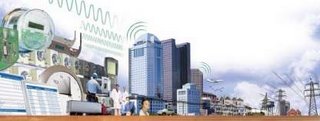The latest copy of the Engineering & Technology magazine carries an article on how Automatic Meter Reading (AMR) in Sweden has proved to be big business. Stockholm based Nacka Energi power supply company has tied up with Vodafone, Sweden and power meter manufacturer Actaris to provide a unique AMR service to the customers. This service involves installation of 25,000 meters in Swedish homes that will be capable of communicating with the Vodafone based GSM mobile phones and transmit the meter readings via the cellular network to the Nacka Energi servers which would then use the data to transmit bills to the customers.

The existence of such a direct communications link between the energy provider and the customer also opens up the possibility of using 'smart' meters that can display the price of the energy consumed and accommodate variable tariffs that favor off-peak consumption.
Mobile phone companies too are eyeing the AMR as a major business opportunity especially as the data can be collected at night when there is much less traffic on the networks, The technology also provides a platform for energy companies to offer additional services such as burglar and fire alarms.
Closer home, New Delhi Power Limited has developed a homegrown solution that restructures its billing system and has the potential to impact 8.5 lakh people across Delhi. The billing and metering system deploys an Automatic Meter Reading (AMR) function. AMR is a remote controlled device that collects the meter reading and uploads it into the company billing servers automatically. This prevents manipulation of data, even at the stage of reading the meter. NDPL also has a spot billing facility. Meaning that with the use of a spot billing machine, the bill can be generated instantly after the meter reading. Hence, the customers see the bill generation process and can make the payment from home itself.
The logical extension for a pre-existing AMR system like the one in Delhi would be to go the Swedish way and offer customers the option of hooking up their meters to their mobile networks. That would surely be a revolution of sorts because that would mean
- lower costs of billing,
- less pilferage,
- more customer oriented services,
- incentives of saving by moving consumption to non-peak hours.
Technorati Tags: India, IT, digital, power, meter, AMR, automatic, cellular, GSM, mobile, phone, Delhi
Comments